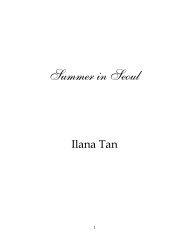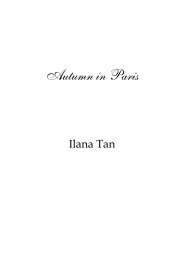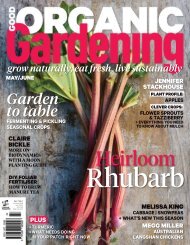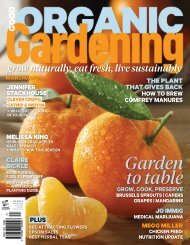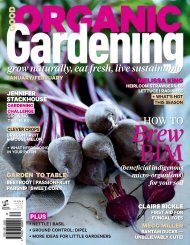6. Good Organic Gardening - November-December 2016 AvxHome.in
6. Good Organic Gardening - November-December 2016 AvxHome.in
6. Good Organic Gardening - November-December 2016 AvxHome.in
Create successful ePaper yourself
Turn your PDF publications into a flip-book with our unique Google optimized e-Paper software.
PEST PATROL | Beneficial <strong>in</strong>sects<br />
We can’t live without bees<br />
MORE HAPPY HELPERS<br />
There are so many great little critters <strong>in</strong> our gardens<br />
that we needed a part two of our good bugs round-up<br />
Words Claire Bickle<br />
Insects are some of the most abundant<br />
creatures on Earth and they all play an<br />
important role with<strong>in</strong> our ecosystems.<br />
<strong>Organic</strong> gardeners and farmers are able<br />
to put aside an aversion to <strong>in</strong>sects that we all<br />
seem to have, probably because of the few<br />
bothersome or aggressive ones, and understand<br />
that <strong>in</strong> nature, there is always a balance.<br />
<strong>Organic</strong> garden<strong>in</strong>g techniques, whereby<br />
the use of synthetic chemicals is eschewed<br />
and soil and plant health are ma<strong>in</strong>ta<strong>in</strong>ed<br />
by the addition of organic matter, will see<br />
balance created and, hopefully, very few severe<br />
unmanageable pest and disease outbreaks.<br />
In our last issue, we looked at beneficial<br />
bugs that wage war on some of the baddies<br />
whose populations can get out of hand from<br />
time to time. Here, we profile a few more of<br />
the amaz<strong>in</strong>g and vital <strong>in</strong>sects that create<br />
balance and important biodiversity <strong>in</strong> our<br />
backyards and our environment <strong>in</strong> general.<br />
Their roles can be as predators, poll<strong>in</strong>ators<br />
and more.<br />
Bees; Order:<br />
Hemiptera<br />
I don’t th<strong>in</strong>k I have to tell you about<br />
the benefits of bees but I will anyway.<br />
These magical <strong>in</strong>sects have captured the<br />
imag<strong>in</strong>ation of the human race s<strong>in</strong>ce the<br />
dawn of time and there are some tens of<br />
thousands of species worldwide.<br />
Bees are regarded as very important<br />
poll<strong>in</strong>ators of so many plant species and<br />
without their perpetual efforts, we would<br />
be a rather hungry human race and there<br />
would be limited plant diversity.<br />
The most recognised bee <strong>in</strong> Australia is the<br />
European honeybee, <strong>in</strong>troduced more than<br />
150 years ago. But did you know that these<br />
imported bee species are becom<strong>in</strong>g feral,<br />
compet<strong>in</strong>g with our native bees for habitat<br />
and nectar sources?<br />
In Australia, we have dozens of species of<br />
native bees. Some are solitary and some are<br />
colony form<strong>in</strong>g, but they all play an important<br />
role <strong>in</strong> poll<strong>in</strong>at<strong>in</strong>g a wide and varied range of<br />
plant species.<br />
Common native bee species<br />
Sugarbag or st<strong>in</strong>gless: It’s becom<strong>in</strong>g quite<br />
common for people to have hives for these<br />
t<strong>in</strong>y little black bees <strong>in</strong> backyards.<br />
58 | <strong>Good</strong> <strong>Organic</strong> <strong>Garden<strong>in</strong>g</strong>













